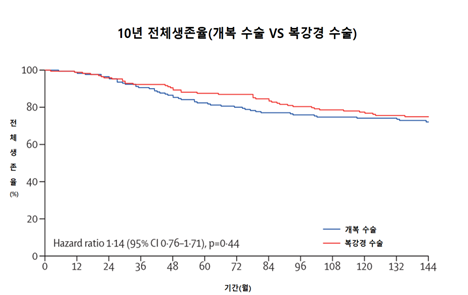Laparoscopic surgery for rectal cancer, as safe as open surgery
- A joint research team at Seoul National University Hospital followed up patients who had rectal cancer surgery for 10 years
- Laparoscopic surgery for rectal cancer, with the world's first proven long-term oncological safety

This study aimed to assess the long-term oncological safety of laparoscopic surgery for rectal cancer using 10-year follow-up data. Until now, laparoscopic surgery for rectal cancer has been widely performed in Korea, Europe, the United States, and Australia, but controversy regarding its safety has been raised due to conflicting results from randomized clinical trials. The results of this study are significant in that they put an end to these controversies and have laid an important basis for laparoscopic surgery for rectal cancer to become a standard surgical method.
According to the National Cancer Registry in 2018, rectal cancer was the fourth most common cancer after stomach cancer, thyroid cancer, and lung cancer. The number of colorectal cancer patients is 27,909, or 11.4% of all cancer patients. Of these, 33% are rectal cancer patients.
Rectal cancer treatment methods include endoscopic resection, surgical operation, and chemotherapy. In particular, rectal cancer surgery is known as a difficult and complex operation because it must not leave cancerous tissue within the narrow pelvis or damage important tissues and organs such as the autonomic nerve and sphincter.
A joint research team at Seoul National University Hospital (Professor Jeong Seung-Yong and Park Ji Won), the National Cancer Center (Professor Oh Jae Hwan), and Seoul National University Bundang Hospital (Professor Kang Sung Bum) conducted a joint research team of 340 patients with stage 2 or 3 rectal cancer who received chemoradiotherapy before surgery from 2006 to 2009. The results of 10 years of follow-up and analysis after random assignment were announced on the 12th (of April).
Of the sampling, the follow-up of two patients in the laparoscopic surgery group was stopped, and a total of 338 patients were compared and analyzed for 10-year overall survival, disease-free survival, and local recurrence rates following the open surgery group (170 patients) and laparoscopic surgery group (168 patients).
Overall survival rate for 10 years
As a result, the overall survival rate and disease-free survival rate of the laparoscopic surgery group were similar to those of the open surgery group.
The 10-year overall and disease-free survival rates for patients who underwent laparoscopic surgery were 76.8% and 64.3%, respectively, and 74.1% and 59.3% for patients who underwent open surgery, respectively.
There was no significant difference in the 10-year local recurrence rate. Cancer recurrence occurred in 3.4% of patients who underwent laparoscopic surgery, compared to 8.9% of patients who underwent open surgery.
In particular, the research team interpreted this study as a meaningful result considering that no long-term follow-up results for more than 5 years of laparoscopic surgery for rectal cancer have been published. The research team said that the follow-up period was extended to 10 years to evaluate definitive survival because the time for local cancer recurrence before and after treatment for rectal cancer is longer.
Professor Jeong Seung-Yong (Dept of Colorectal Surgery) said, "Although random clinical studies on rectal cancer have been published, there has been no study that analyzed long-term survival through a follow-up of more than 10 years." "This study is meaningful in that it confirmed the long-term oncological safety of laparoscopic surgery for the first time in the world using rectal cancer patients who received chemoradiation therapy before surgery," he added.
The results of this study were published in the latest issue of 'The Lancet Gastroenterology & Hepatology (IF 14.789)', an international academic journal related to lancets.
Meanwhile, the research team reported in 2010 that laparoscopic surgery for the same patients resulted in less pain than open surgery, faster recovery after surgery, and better short-term quality of life. In addition, in 2014, it was reported that laparoscopic surgery was similar to open surgery in terms of 3-year disease-free survival as the primary final indicator of clinical trials.